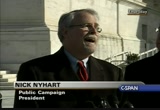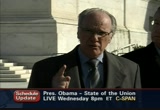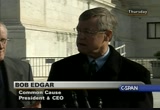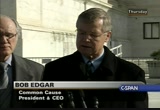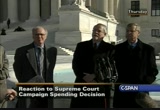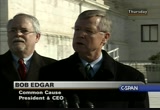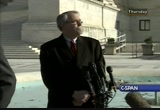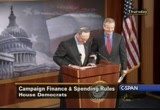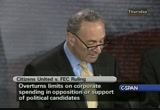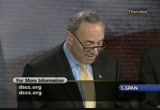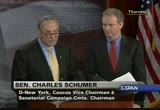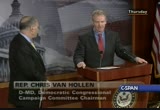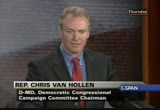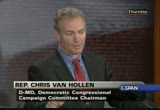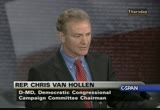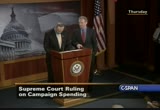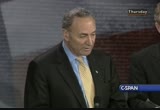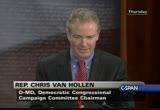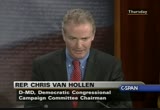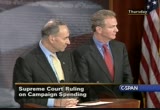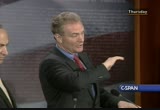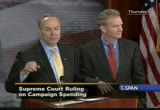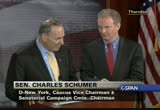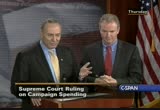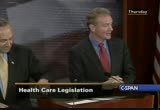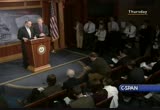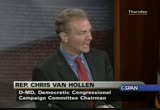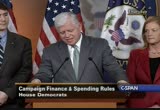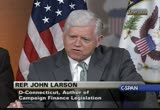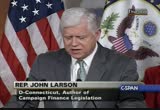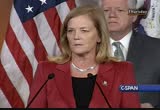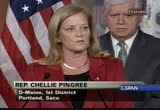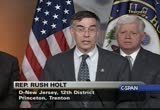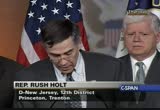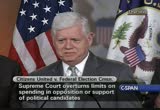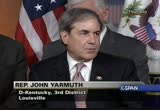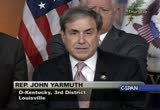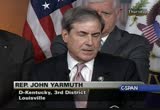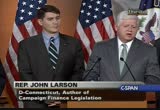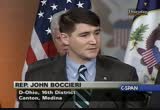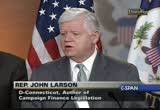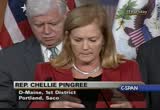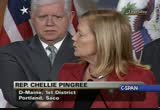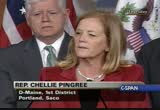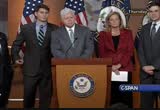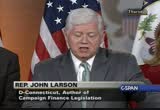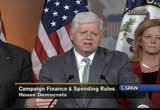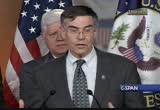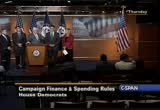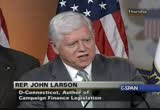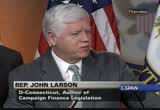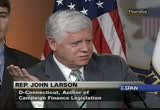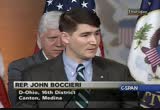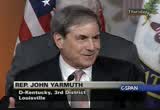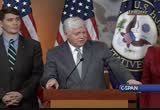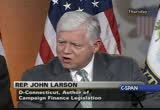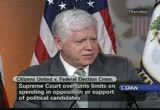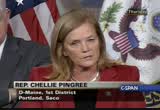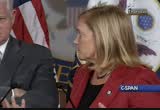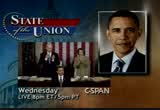tv Today in Washington CSPAN January 22, 2010 6:00am-7:00am EST
6:00 am
6:01 am
>> we'll take your questions. anyone have questions for those of us who -- thank you. >> what legislative changes might be on the way? >> there are a whole host of legislative opportunities that look to come forward. fair elections now. we know that the president while he did not take public funding for the presidential
6:02 am
campaign knew that system was broken. we anticipate that will be a piece of the fix but there will be other opportunities once it is carefully analyzed and reviewed to figure out how you can look at the decision and work around it. i don't think until the supreme court changes its mentality. one interesting thing today is they overroad a previous decision, and i'm an optimist having served in congress, having served in congress, i'm an optimist that they will realize corporations are not individuals and should not have unlimited access and perhaps shareholders will rise up and put pressure on corporations not to searchly squappeder and dip into their treasuries and plow that into campaigns and we hope that the american people will just simply be horrified by this.
6:03 am
you know, take a look at the mortgage crisis that we faced and the housing crisis. it was political contributions under the current system that diluteed the regulation that is should have been in place to protect the public. now we're facing economic tsunami because of those bad operations. supreme court needs to go back and rethink this. a conservative supreme court decision, a wall street decision. it's a corporate decision, and i think over time the american public is going to be simply outraged by it. >> let me just add one point about the fair elections act. let me add just one point. it would magnify the power of small donors and stop candidates from taking contributions worth more than $100 from everybody and allow them to pay more attention to their constituents. >> what will elections look like going forward after this
6:04 am
decision? i mean, do you expect to see more attack ads financed by corporations or do you anticipate direct endorsements by corporations? >> well, i think the fundamental thing it will do is make elections more expensive. when you know you will be attacked the best defense is to raise even more money which sends members of congress to find more bundeled money. that's the last thing we need here in washington, candidates spending more time finding deep pocket checks. >> it could also mean a rogue corporation can look around at the votes that are cast, 1,000 votes a year, pick a vote or two they don't like and a congressman they don't like and a district that has $500,000 or $1 million spent in a campaign, and they can plow in $5 million or $10 million and recycle elected officials or bring on
6:05 am
elected officials who are simply puppets to that corporation rather than serveing the public's interest. >> i would also add i think one effect of today's elections is the amount of corporate wealth that can be spent. take the fortune 100 companies. they had something like $15 trillion in revenues. during the last election cycle and several hundred billion dollars in profits. imagine what that kind of money can do if a candidate is running for office and a corporation can spend $10 million or $15 million for or against that candidate. doesn't it emake sense that that candidate is going to be beholden to that corporation that has put it in office? you can forget about the senator from nevada or minnesota. it's now going to be the senator from microsoft or corporation on the other side
6:06 am
of the world. >> thank you. we have calling cards if you need to get in touch with us. there are several press conferences that are going to be held on the technical aspect of it. some of them will be from our organizations but there are others that will be analyzing from a technical point of view. thank you for taking our word. >> now more reaction from the court's decision, new york senator charles schumer announced hearings on cam spaineding. he was joined by congressman chris van holland head of campaign efforts for democrats in the house and democratic caucus chairman john larsen and other house democrats. this is 50 minutes. >> good morning, everybody.
6:07 am
i am proud to be joined by my friend. we are each taking the lead in our respective bodies on this case. this morning, the supreme court announced its opinion in citizens united. while my staff and i are still reviewing the opinion, this much is clear. the roberts court have turned back the clock on our democrat by over a century. this disaster decision paved the way for a free around limited spending in our election. with the stroke of a pen, the court decided to overrule the hundred-year-old ban on corporate expenditures and override the will of millions of americans who want their voices heard in our democracy. now they can act like pair sites striking at the very root of our democracy, at a time when americans are worried
6:08 am
about too much influence, this opens the flood gates and allows special interest money to overflow our elections and undermine or democracy. today's ruling decided by the limits of majority, guts our system of free and fair elections. >> the bottom line is this -- the supreme court has just predetermined the winners of next november's election. it won't be republican. it won't be democrat. it will be corporate america. our system of government's the best in the world. due to the ability of average citizens to participate and gauge their elected officials without their belief that there are corrupting influences at play. but this opinion if gone unchallenged would have permanently changed future elections allowing corporations to spend at will could have undue influence on elected officials.
6:09 am
the money spent and air time purchased will dwarf the voice of average americans. i have not seen a decision that more undermines campaign finance and is probably one of the three or four decisions in the history of the supreme court that most undermines democracy. we will depret the day that this decision has been issued. and at a time when americans are so worried about having say in washington, this just brushes those worries aside and says leave it to big money. they'll take care of you. so i stand here today, along with congressman van holland to say we will not let this decision go unchallenged. every single voter, every future candidate for office will be an underdog against the big business interest empowered by this election.
6:10 am
as chairman of the senate rules committee which is the committee with jurisdiction over these issues, i am announcing that we will hold hearings on the intact of this decision within the next couple of weeks. at the hearings we'll explore what the potential litigation could mitigate this decision could have on our democracy. chris and i are committed to pursuing that -- at the very least moffitt in a significant way. we cannot. we will not allow for corporations both to undualy information eelections and cast a shadow of corruption on our depoth. it is impairtive if you believe in this democracy to act and act now, and we will. >> thank you, chuck. very pleased to be here with my friend and colleague, chuck schumer and look forward to working with him to make sure we do everything possible to make sure that this decision
6:11 am
does not stand. that is very, very sad day for american democracy. and this is a very radical, radical decision that came out of the supreme court of the united states, a court that said they respected precedent. this throws out decades of precedent designed to protect the citizens and the integrity of our political process against big money special interests. it will open the had no gates if left unchecked and unchallenged to more and more special interest money, big corporation money at a time as my colleague, senator schumer said, we need to be reducing the amount of influence of special interest money. this takes us in the exact opposite direction from where america wants to go. it will allow the biggest corporation of the united states to engage in the buying and selling of elections. if you look at the staggering figures of the fortune 100
6:12 am
companies and the revenues they have and the profits that they can now unleash directly in these elections, has the potential to totally up end our system and corrupt the process in a way that i think should alarm every american citizen. just think of some hypotheticals, and as my colleague said, we were still going through the court decision. but imagine aig that just received millions of dollars of taxpayer money being able to turn around spending money to advertise against people who didn't want to provide them support or disagreed with the aig agenda. think of the biggest firms on wall street at the time we're trying to hold them accountable to be able to take money and defeat those who call for greater transparency on wall street. think about u.s. corporations
6:13 am
whose main financial interests and majority profits come from investments in china and where their profit margens are attached not to how well americans or american citizens are doing, but how other ins other countries are doing and having them spend money in our elections here to influence and benefit their profits against the interests of american citizens. this is a scanned louse decision. this is a decision that -- for the purposes of expending moneys in elections says that corporations equal individuals. i think it's an un-american decision and when american people understand what this radical decision has meant, they will be even more furious and concerned about special interest influence in politics
6:14 am
than they are today. so i look forward to working with senator schumer to explore every option to make sure that they do not turn back the clock on decades of precedence that was designed to prevent big corporation special interests from corrupting the political process. >> just one other point. so much for the justice roberts view of modesty following precedent. he turned back the clock 100 years on one of the most vital parts of our democracy. ready for questions. >> senator schumer? >> yes. >> do you have any information or indication from anyone else on the other side of the aisle who might help you gain the votes? >> we've talked to both senators mccain and feingold and we'll be working with them on in. we haven't goten into specific
6:15 am
details because we had to wait for the decision -- excuse me. we had to wait for the decision to see where to go, but senator mccain and senator feingold have expressed interest in trying to get involved in dealing with this decision. >> what are some of the options you have with responding? >> there are many different options and that's what we're going to explore. we have been looking that the obviously not just starting today but for days and months before. and there are various options which i think i'm not going to go into now, but there are different ones. well, i'll throw out a couple. there's the corruption issue which the court dealt with we don't know how shareholders held with this extensively and there are others as well. >> is it going to be tough to get anything passed? >> on this issue you might find
6:16 am
some bipartisan support. >> what danger does this pose to democratic candidates given democrats on the hill push health care reform which wall street doesn't like and there are big corporate interest that is don't like this, so what does this mean for democratic candidates in 2010? >> well first let me say the congressional democratic campaign committee, one of the things we've done well over the years is to create sources from the grass roots from people throughout this country who have a little extra money and want to participate in the political process. we've seen that grow over the years. special interest money already threatens to overtake some of that grass roots support, and that decision obviously increases and expands the opportunity for special interests to influence the
6:17 am
outcome of elections. we will be sending out the alarm to citizens as we work to try to scale this back to let them know that their democracy will be -- is at stake. and that may rally more grass root support because now you really do have a situation where this has got to be a wake-up call for every sthain they cannot allow corporations to call the shots on these elections. so we're going to be working hard to get the word out. we have had to fight these special interests moneys in previous cycles as you know there are other forms in which these special interest moneys can get into elections but this essentially allows big corporations to main line those moneys into these elections, so there are two ways to deal with it. one is to work as senator schumer and i have been doing for weeks to identify ways that we can respond lemming is
6:18 am
latively, and i would certainly hope as the senator said that, this is a bipartisan issue. this should be a bipartisan issue. that is question of making sure every citizen's voice is not drowned out by big corporations and the other is a call to action to people around the country who do not want their democracy to be taken over by the biggest special interests in the country. >> senator schumer, let's look when they think of those special interests to run by things like the sierra club or ads or associations which is there a way to carve out corporations separate from those and allow special interest groups to -- >> the whole point of the supreme court decision is no. they say you can main line money right from corporate treasury on to the campaign field with no limitation. >> i mean, with you guys trying to tackle this i imagine a lot
6:19 am
of people wouldn't mind those groups to -- >> it's not changing things for those groups and there are corporate groups that do it, too, but there are certain limitation that is have always been out there. this brushes away all the limitations. >> could you give an example of to candidate x, what, in your viewpoint happens to that candidate, what types of ads, what volumes of ads, how does it affect the campaigns? >> sure. let's say you had a member of congress who wanted to make sure that we helped aig accounting. let's say we had a member of congress that wanted to hold another big wall street bank accountable and they decide that this legislative effort to protect the public good ran contrary to their interests, their pocket interests. you could have an ad and again we're looking through this. but the consequence of this decision, you could have an ad
6:20 am
run directly against that candidate paid for by aig. this will house those corporate treasuries? >> unlimited number of ads? >> unlimited number of ads and unlimited amount of money anywhere they want in the country. >> so somebody's fighting the drug industry. and they decide to make an example of this candidate. they put $50 million of ads against this person. he loses. how many others are going to go oppose the drug industry? it's poisonous. it's poisonous to our democracy. and you know the court is very cute here in a certain sense. oh, you can't say don't elect smith. but you can say smith's a horrible person. call him up and tell him not to be so horrible and that's an ad. who are we kidding? it's the same exact thing, and it can be done no longer 60 or 0 days before the election but up to the day of the election.
6:21 am
this will dramatically change the structure, the warp and wolf of campaigns, for the worse. and this is what is -- this is what so upsets me. at a time when people are feeling estranged from their democracy, this is doing to make it so much the worse. i do believe, and i don't think i'm i'm exaggerating. this threatens the vieibility of our democracy. it threatens what we're all about because we know how much in our experiences both of us know how much money can influence things. both of us know how it's unaccountable and how the ads can exaggerate and twist and successfully win. what is happening here, and i am appalled at justice roberts and justice kennedy. because there's always a balancing test in the first amendment. can't falsely scream fair to in
6:22 am
a theater. we have liable laws but when it comes to democracy versus corporate power and wealth, there's no balancing test? >> there was a report last week that insurance companies were spending an estimated $10 million or $20 million to oppose the democrats health care plans seems like corporations are already spending a lot of money. >> right now a corporation cannot just write a check out of its treasury and fund a whole campaign against a candidate. after today they can unless we're successful with our legislation. that's the difference. they have to -- they have to -- there are many different limitations on them, but now they are bhone away and these limits have been in existence since 1907 in the tillman act and they are gone. so the idea that this is -- this is the worst -- anyone who has nightmares any of you
6:23 am
strange people who might have had strange nightmares about -- like i do. this is it. [laughter] >> all the other questions are asked about this issue, health care, provide any update about where that hands? >> well, i think -- you know, i don't know what happened at the house caucus but we're all exploreing the right way to go. obviously we cannot just proceed as if nothing happens because something very significant happened. there's a strong view in both caucuses that we want to do some good things in health care, and the question is how? how much and how quickly? >> do you prefer scaled back? >> i'm exploring. i mean, obviously there are different options, and you have to look at each. you can't make a decision. how long will each one take? i don't think we want to do health care the next three months. so there are tradeoffs here, and that's what everyone's
6:24 am
exploring. >> speaker pelosi said they wanted the votes in the house to pass the senate bill. what are the options left? >> well, you know there are a number of other options and we're discussing them. >> i think there have been widely reported in the press and there are a whole range of them and none of them have preference at this point over another so we're doing in the house what senator schumer said they are -- >> but what about a decision on how to proceed? >> well, my view when i said this to our caucus yesterday, we can't rush to judgment. we don't have to have something on the floor today or tomorrow. you have to take a deep breath. explore the ramifications of the elections and then figure out where to go. that doesn't mean we're going to twiddle our thumbs for weeks and weeks and weeks but lit take a few days to figure out where everything is. >> our goal, at least our goal,
6:25 am
and i think chris', too, is to put something in face that would affect the 2010 election. now it's not easy. this is al first amendment decision. so statue story change that is lie in the face noo fly in the face of that decision won't work. but as i said, we've been thinking ant this for a while. there are a number of avenue news. some of them may have been limited or made harder by the words of the decision. particularly, as i said on the pay to play and corruption issue. but we're going to look at everything. >> can you outline that legislation? >> no. because we don't know yet. we are going to have hearings and then come up with the most effective legislation that has the best chance of passing. >> you really have to look at the full scope of the decision and interpret how lit apply. but the early reading of this is that as we said, this is a very radical decision. very wide in scope, so we're really going to have to go back and look at the different
6:26 am
options to see which ones are but again, like the senator, i agreeed the integrity of our democracy are at stake. >> and there are things that can be done. there's no solution. >> thank you. [captions copyright national cable satellite corp. 2010] >> folks back there set? >> you're welcome. i'm congressman john larsen from the first district and chairman of the democratic caucus. i'm standing here today with a number of our colleagues who are in support of the fair elections now act.
6:27 am
never has it become so important as based on today's disasterous and devastating decision for our democracy. in a system that is already flush, if not drowning in special interests and the flow of corporate money, influencing interest and legislation in washington, d.c., as "the washington post" points out, just in health care alone to the tune of $1.4 million a day. now to have open the flood gates of corporate contributions coming spot system is unbelievable. as justice stevens said, it's a it defies common sense. in fact, it ignores common sense. and it focuses on the dollars
6:28 am
and cents that have made this system corrosive. we feel proud as members standing here today that we have a solution, a remedy that can pass buckley varyo valero. that will provide us with the opportunity to have the option to turn to small donors so we don't have corporate interests drowning out the voices of everyday americans who have a great stake in this great republic of ours and in our democracy. and that's why we're going to move forward with this legislation in as timely a fashion as we possibly can. there are great examples of this legislation that exist across this country. in maine, connecticut and arizona and i'm proud to say one of the lead co-responseers of this bill shelly is here to speak next who has first hand knowledge of the bill in effect
6:29 am
in maine. shelly? >> thank you, very much. chairman larsen, thank you to everybody for being here today and my colleagues who are tall strong supporters of finance reform and i first want to echo what my colleagues said. it sets back elections 100 years. i think about this today. this means that big banks, big pharma, insurance companies can come in and pick the people who oppose reforms, spend all the money they want on them and turn back the cause of reform, and if we've been hearing one thing from the voters they want change. this is the opposite of change and it's depoipping to be very bad for our system. that's why many of us are standing here today to talk about the fair elections act. i've been a strong supporter because i come from the state of maine where since 2000 what we call clean elections has been the norm. 80%-plus of our candidates in
6:30 am
maine running for the statewide elections use the system republicans and democrats. we have qualifying contributions, you have a certain then you're under the public financeling system. it caps and we think it change it is way we legislate in maine and i'm proud to say my daughter is the speaker of the house and when i first ran for the federal office, i didn't win that year but when i ran in 2002 i spent 40670 hours a week doing nothing but sitting in a little room raising money like many of my colleagues do. that year my daughter age 26 was running under the clean elections and at 26 she got her qualifying contributions and qualified for the public money and enough money to run her campaign and while i was in that little white room making phone calls she was going knocking on doors and proud to remind me she won. she went on to serve as the
6:31 am
speaker of the house and it's been a wonderful tool for people who never thought they could run for office because they didn't think they could raise the money now run for office in maine. it's changed the way we legislate and the way people spend their time and as you know many candidates today do nothing but raise money to keep up with the system. this is doing to change the way we go about governing. this is a very bad decision and truly opens up the argument for why we need to change the systems fair election is a great way to do it and i'm deprave to chair larsen for moving this bill forward. >> leader in campaign finance reform and chief advocate of making sure we have a traceable paper valid threshold. >> thank you, chairman larsen. the decision from the supreme court today as i understand it is a slap in the face to ordinary americans.
6:32 am
it's a century-old doctrine that it should be that special interests should be kept out of government. now we've been struggling to do that ever since. but this is a setback to before teddy roosevelt's time. it is gutting campaign finance laws across the country. now at all levels of government. we're not just talking about congress here. the people are saying to elected officials in every town and county and every congressional district around the country, listen to us. don't listen to the special interests. well, the can a cough any now -- kakofany now of special interests with mega phones larger than you've -- mega aphones larger than you've ever seen in your life, will drown out the voice of the people.
6:33 am
if they think right now that elected officials aren't listening to them, they have not seen it yet. the larsen legislation that i'm really proud to co-sponsor depose a long way towards fixing this problem that existed in part before even before the supreme court decision. that now must, must be addressed in light of this decision for the supreme court. it could offer candidates the choice of assessing public funds and accessing public funds for their campaign. if they reach a certain threshold, in effect, it will restore the voice of politics back to the people. so important. >> one of the leading authorities on our constitution , in this congress, i'm proud
6:34 am
to say, though hails from kyi a yale graduate, john. >> thank you, john. when i heard about the supreme court decision today, the first thing that occurred to my mind was that line from "american pie" the day the music died and i kept thinking today is the day democracy died. i hope that's not the case but i have great fear that this decision is of that magnitude. as russ said, people are wondering throughout whether congress works for them or the wall street banks. they won't have to wonder anymore because they will be the senator from goldman sachs and the gentle woman from pfizer. make no mistake about it. while the legislation congressman larsen has introduced with us is not necessarily a direct response
6:35 am
to the supreme court decision, it will do one thing, and that is that it will be a signal to those voters of the people who are not reliant on corporate money or special interest money, they will know that the people who are accepting the voluntary funding public funding under this bill are people who truly stand for them. and i think that's going to be an important element of our democracy as we move forward under this new structure, which unfortunately is going to be thrust upon us as of today. one of the things that we've talked about, shelly talked about it. the enormous amount of time candidates have to spend to raise money, realize that that is time that the people are actually paying for. i mean, we work 24-7 and we aren't really on the clock. but the number of people on
6:36 am
this congress who spend 20-30 hours a week raising money, do it because they -- they have to gout and raise these incredible sums money. one other highlight that's not been discussed much and i'd like to raise is that i think this bill will help to end a lot of the partisanship that exists in the system. we have to raise so much money and raise it from not many of us in our districts have enough friends and supporters that we can raise a million or $2 million or $3 million out of that district so we have to call big doneers across the country and ask them to send us money. well, if i'm calling from kyi to a democratic donor in california, why is that person going to give me money unless he or she understands that i am going to be a reliable democrat? same thing goes on the other side.
6:37 am
if we have to fund our campaign and not necessarily our party loyalists i think there's an opportunity to reduce some of the partisanship because again, we're going to be accountable to all of our donors who will be the public rather than just the party's donors or special interest donors so i'm very proud to be standing here today on what i hope is not the darkest day in democracy's history and support this important legislation which will, i hope, maintain our connection and democracies connection with the people of the country. >> gentleman from ohio, from our freshman class epitomizes what it takes to get elected. and like so many members has had to spend an inordinate amount of time going to d.c. in dialing for dollars tapped stakes have just gone way up with the passage or this ruling
6:38 am
by the supreme court. and it will have a system, a wash with money only comp pounding the problems that currently exist in what has become a very corrosive process. john knows this first hand, the gentleman from ohio. >> good afternoon. i'm john from ohio's 16th district. today's supreme court decision, the regressive decision of the supreme court today has just handed the keys of electoral government over to the corporations of this country. and we have seen as if the supreme court justices have rolled up to the drive-thru window and supersizeed the covers and their influence and undue influence they have in the electoral politics and in the influence of legislation. enough is enough. the american people have spoken loudly that they want people elected to offices who are responsible to them and not the special interest groups that have so much undue influence in
6:39 am
our electoral process. we need to end this. campaigns need to be about issues and ideas not who has the biggest friends and most wealthy banks, we all stand here today because we're deeply concerned about our democracy. we want to see a government that is responsible to the people and this undermines. i've spent 10 years nearly in the state legislature of ohio. this undermines so much work and effort that's gone into making the halls of not only congress but of our own state legislatures more ack accessible to the people, so i stand here today firmly and strongly behind this legislation and it's time we hand the keys of government over to the people and we need action and results not more supersizing of corporate campaign dollars involved in the electoral process. >> both rush and john have made the point that it not only impacts congress but it also
6:40 am
impacts our state legislative races and municipalities and i'd like which he will will he again because of her experience in maine to go through the bill. chelle, if you could? >> well we're happy to get any of you a fact sheet but a capped dat is required to collect a certain number of qualifying contradict soss in a congressional race you have to have 15 contribution from the 5-10 in-state residents once you've called that makes you a certified candidate then you're given an allocation separately for the primary and general and that's the money that you have to run on. under this system which is somewhat of a hybrid and a little bit different from maine you're also allowed to collect additional contributions of under $100 and those are matched up to four-to-one so there's a limit on how much you can collect under matching funds but that's another way to
6:41 am
enhance your campaign covers but all under $100. there are two ways how the system works. it sounds easy when you start talking about it. i'll justice get a bunch of people to write me $5 checks. we have 23 gubernatorial but a lot who say those qualifying contributions are a little harder to get than you think. it's not easy to walk up to everybody and say will you write me a $5. check but that makes sure that you have a certified legitimate candidate. people are worried the government money is going to go to a bunch of people whop don't qualify. this is a good limitation here and second it means once you qualify you don't have to spend all your time in a little white room making those calls. you're still allowed to raise contributions up to $100 but as a congressman mentioned you're not calling to california to get $100. you can ask people who never
6:42 am
had a chance to contribute to elections ever before and we've heard that from maine, arizona, connecticut where this law's already in place there for judicial election ins north carolina and certain election ins new mexico and a lot of people say wow, i gay $5, i'm a part of the political process. it's not just the people who write the $4800 checks, everybody matters. i think it change it is way we govern and citizens year 2000 in the state of maine when we started this where there was a little bit of skepticism in the beginning but a tremendous part of support we now have over 80% of our state legislature republicans and democrats. nott partner people have come to understand. it's easier to recruit candidates because people are more willing to put themselves throughout if they are not behold on the special interests and i can tell you my daughter when first elected served on the appropriations committee and said one day i was sitting there listening to testimony and realized i don't have to
6:43 am
think about whether this person wrote me a check or not, i can justice say is this good policy? that's what's different in the state of maine. people can just say do i agree with this policy or do i have to pay this person extra attention because i have to call them and ask for contributions. i get to just decide on the merits. so my cleaggeds said this is not a direct response just to that but if you think about how the flood gates will be open and campaign contributions from corporations are going to poor in for all the people in congress who have been on the side of reform they are going to have to spend that much more time in the little white trooms natural money that's going to come from the outside with these contribution soss we're going to see pressure like we never did before that's why it's more vital now than ever to pass this bill and that's why i'm proud to stand here and make it work. >> thanks. cleaggeds feel free to jon: ?
6:44 am
>> open up the flood gates in a race, the public money, will it really do that? how much public money are we really talking about? zp the short answer is i don't believe public money can compete with the corporate money. but i believe the public's awareness of the difference between the two of a money raised to small donors in qualifying in a manner that requires you to go back to your district and home state to raise that money is far different than special interest money flowing in from all over the country where the only responsibility that you have is to, and whether you can draw the bright line between whether that influences your legislation is a question i'll leave up to all of you. but certainly, i think in a system, it's pretty clear that it's made the process corrosive. legal under the law and with
6:45 am
the supreme court ruling today, i just think that especially given the struggle that's currently going on to pass health care reform in congress and with the amount of money $1.4 billion a day being spent by the health care industry, a day. and what we've seen in the -- between the two bills in the -- and the senate, it makes the specter of this -- these demood gates opening, as shelly said of more maun wash here? wow. >> as one impact of today's ruling do you have any idea what -- on the table until >> well, think there will be several ideas with respect to legislation. and i think that this is the --
6:46 am
there's quite a bit of conversation about having fwoils require shareholders to make sure they get a say in this process as well. this bill has been out there and has been worked on for some time as you know it's bipartisan and dick daughter ban is a supporter a co-sponsor in the senate. and i'm proud to say that walter jones here is a co-sponsor, was unable to make the press conference today, but i believe there are many members on the other side of the aisle who also are frightened by this prospect of the corrosive nature of the system being a wash in special interests. >> may i just comment on that? >> mr. larsen's legislation is based on this good idea of making funding available to ordinary folks. to, you know, bring in ordinary
6:47 am
people to the process. that is critical. now today's decision of the supreme court seems to go even farther than my m people feared hit that would. and it seems to remove any protective period close to eelections. it seems to really open the flood gates or as i was saying, give special interests a huge megaphone. so it probably will require some other attention. but you know, even requiring shareholders to approve or some other legislation that you might imagine is going to -- is not going to solve this problem entirely. this is going to take a lot of thought. >> as far as your bill, you'd have to raise public funds, how are you planning on doing that? if you're going to match the
6:48 am
contradicts? >> well, we have several different proposals, the senate proposal differs from ours, but right now we're looking at a tax on, you know, in looking at the broadband in terms of trying to dedrive money from the specktrum, and that's an area that has been used quite a bit, but also one that we think is very fertile and has a connection to ultimately communicating out to the public your interests, so we think that that's an area. we're open to several and several of our members and serl of our people, we have more than 130 responseers to the bill. the bill has had a hearing already in the house of administration committee, they have some ideas as well. so it's open, but what's clear in our proposal is the desire to get this done and get
6:49 am
reconnected with the people. yes? >> special interests is one of the words that gets bandied about, and it seems depending on which side of the political process you're on, whether it's republicans and democrats, corporate/non-profit, local-national, depending on that special interest has a different meaning. how would you define special interest? a? and b, do you take any money from groups that might be defined as special interests? and c, does the supreme court decision affect the way you'll have to raise money and approach fundraisers? >> i don't think the supreme court ruling -- and i haven't read it completely, and there hasn't been a complete analysis of it, exacts the way this bill would prevail upon members to raise money at all with respect
6:50 am
to the definition of special interests. that's a broad definition. it could be extraordinarily broad, but let's look at where the money comes from and if the old saying follow the money and you get a pretty clear picture of who is able to have enormous influence here on the hill. i don't think this is any surprise or mystery, but i think the more unmasking and the more reporting and the more peeling away the have a near, so to speak, will be even more revealing as we're just -- as we're going through this current process of trying to pass health care. and the enormous amount of money that's been poured into block the attempts at passing health care here, and especially at this point in time when that's a very -- its passage is hanging in the balance -- wow. to allow, you know, the kind of
6:51 am
money that can now be poured in from corporate entities seems like it would tip the scale enormously in the other area. yes? >> to add an analogy, if you will, as an analogy, we're a pee wee football team. we're getting geared up, ready to go play in this nice game. all of a sudden the supreme court says instead of playing this other pee wee football team you now have to play rose bowl champion ohio state buckeyes. this is what we're going to be competing against. the ideas have to be fairly and evenly processed that gives people the power in spobalt of ownership in our government. last time i checked corporations don't vote. the people vote for this country of this country and they want a government that's responsive to them. you know, special interests, i have a special interest in congress to make sure we administer government fairly to
6:52 am
the people, that we set up a fair system by which the government sets the boundaries and there is free market operate in between but be a good referee and when someone goes out of bounds, you throw the flag. unfortunately the supreme court has just changed the rules of the game. >> just another comment. i think that the impact of this supreme court decision on individual fundraising could be enormous in a number of ways. let's take my market. i have one media market in my district, louisville, kyi, if a corporation decided to spend $15,000 they would buy up every spot that was available. if they didn't they would drive the cost so high that other people running not just even in my race, would then be forced to go out find some way to reach voters through the media.
6:53 am
whether it's a legislative candidate or whatever, they are not going to have access to the time if there's this huge amount of money there that can be spent in the final stages of the campaign without regard of having to raise this. yes indications are far greater than the influence that there might be an particular election, the yes indication systemwide are potentially huge and dangerous. >> one more question. >> thank you. >> how do you expect the supreme court decision to influence energy reform? and that entire debate? and further more, how would your bill help curb that potential influence from energy companies? >> well, i can't say that the bill will curb what the supreme
6:54 am
court opened. but what i can say is that lit draw a clear distinctings and i think the -- will play a huge role in drawing those bright lines that exist. that is the hope of the bill and the clarity to inform the public. the public will know around even though our system is voluntary, you can pop spot system or choose not to participate in it. that's what allowstous pass constitutional muster, but the public is going to know. and i think the public feels very strongly about this. they see their government being hijacked. in this case, there certainly has been, always been a concern that especially within the beltway and the unbelievable influence of special interest that the system is a wash with money. and people feel as though their
6:55 am
voice can't get through. this bill will allow their voice to get through. and that's what our goal is. i think you'll see other proposals. i haven't sat down with chris, but i am sure he has an interim proposal, because this is -- this could tip the balance incredibly. and especially with redistricting on the horizon as well, and so much at stake in state legislative bodies, and municipal races, this decision is enormous. but all the more reason for us to focus on drawing the public back into this and getting their attention. >> what about the issue of energy reform? the potential of a company like southern company, or exxon mobile pouring in millions of dollars into specific races? what fears do you have about that? >> that's the whole purpose of this. we have great fears that that
6:56 am
will happen. and if you look at -- if the past is pro log, all you have to do is go through any campaign filing. then it's almost an assurety that that will happen. and we think our bill pushes back against that, by drawing a distinction between how electorally, you come to office. and while you're there, how you're able to conduct yourself, in terms of whether or not you continue to just dial for dollars or whether or not you're dialing up your constituency and working on their behalf. >> you know a couple people asked how are you ever going to have an equal amount of money? you don't. for some if you have enough money to run for office, you have a reasonable campaign but we have seen a shift in maine. it starts to change the culture
6:57 am
around elections. if people see a corporation pouring millions into one candidate who then says they are in favor of their issue, it's right out there in the public. we had a three-way primary in our last depube in atorial campaign. on the republican side two were clean elections and one wasn't. now he was the favored candidate. that had best name rec innings in addition, seb indeed congress in the past. people thought he was going to win but it game an issue he was not the one and they started saying why do you have all this tobacco money and so the press changes its perspective. people, you knock on their door and people say are you a clean or fair elections candidate? it starts to change the culture of the way things change. it may not be that you have as much money but in the end you're on the right side and
6:58 am
that's what the public is asking for today. >> the public financing, a company could still run as many ads supporting or opposing that person if they wanted. >> under this ruling, yeah. because the fair elections, our bill would not impact this decision. our bill, and i think as which he will live said it far better than i in terms of changeing the culture and being able to draw those bright lines and certainly this is something that will be of keen public interest. with that, we thank everybody. >> thank you. [captions copyright national cable satellite corp. 2010] .
6:59 am
128 Views
IN COLLECTIONS
CSPAN Television Archive
Television Archive  Television Archive News Search Service
Television Archive News Search Service 
Uploaded by TV Archive on

 Live Music Archive
Live Music Archive Librivox Free Audio
Librivox Free Audio Metropolitan Museum
Metropolitan Museum Cleveland Museum of Art
Cleveland Museum of Art Internet Arcade
Internet Arcade Console Living Room
Console Living Room Books to Borrow
Books to Borrow Open Library
Open Library TV News
TV News Understanding 9/11
Understanding 9/11